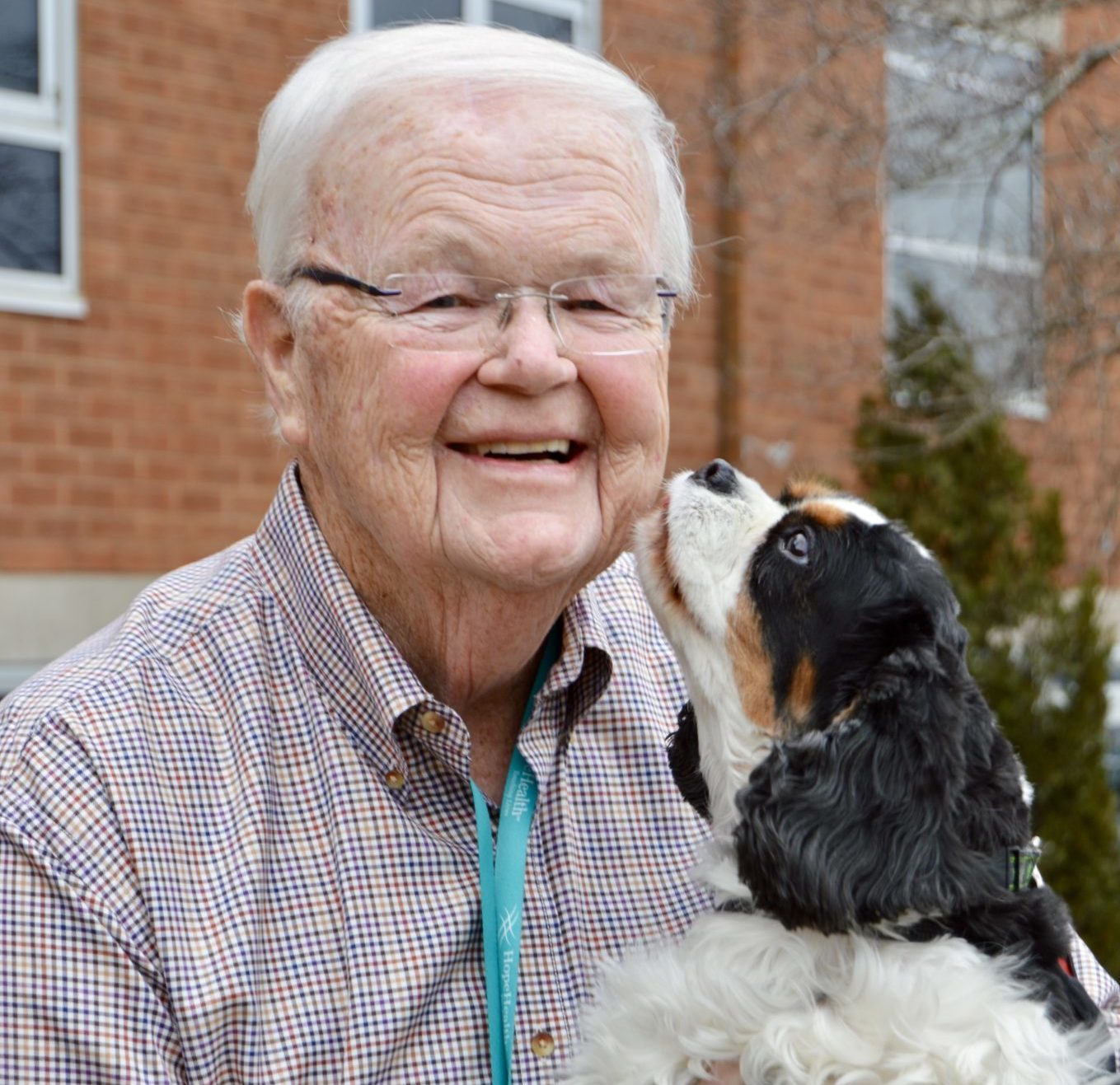For a person nearing the end of life, small things like a sweet song or friendly dog can bring a lot of comfort.
That’s why HopeHealth offers music, animal therapy and other alternative-support services to hospice patients and families. And it’s our compassionate volunteers who make it happen.
Below we share stories of volunteers using their special skills—in music, meditation, pet therapy and Reiki—to help others.
Singing songs of comfort
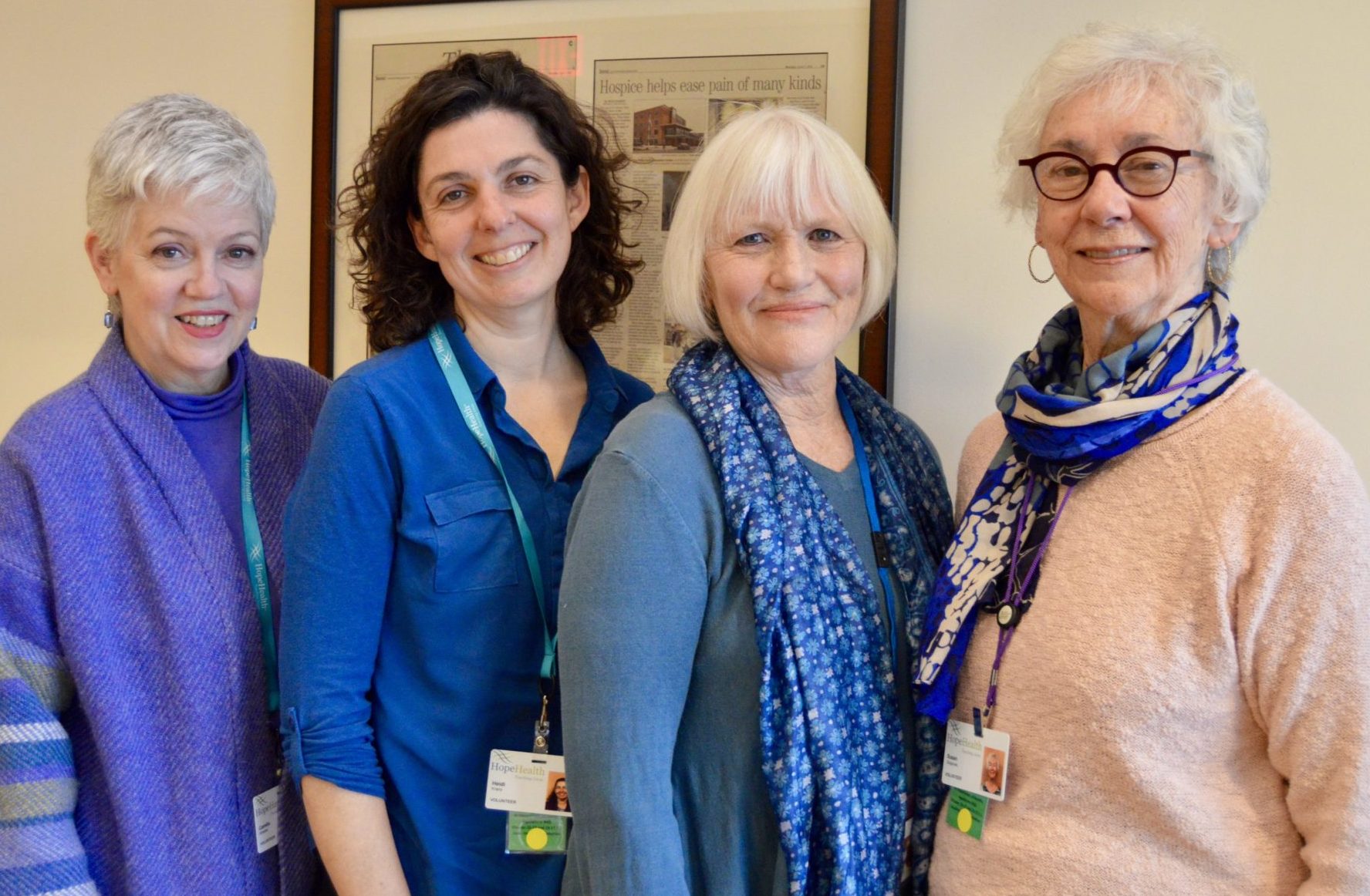
On a rainy afternoon in March, four women dressed brightly in blue gathered in the hallway of the HopeHealth Hulitar Hospice Center, settled themselves into silence, and respectfully entered a softly lit patient room.
Inside, a patient named Pamela Sherer lay in bed, clasping hands with her sister seated beside her. The women in blue, members of the Grace Notes Singers, took chairs around the bed and began to sing.
Pamela never spoke but gazed at the women while hearing their gentle medley of hymns, show tunes and folk songs. After several songs she smiled faintly and sung, too. When later she fell asleep, the women departed the room while singing their lullaby.
Bedside singing “helps create an atmosphere of love and support and care,” says Pam Steager, a founding member of Grace Notes Singers.
Listening to music can be a profoundly comforting experience for someone in the final days or hours of life. HopeHealth has several volunteers with music skills, including a pianist and violinist.
Grace Notes Singers is an all-volunteer chorus dedicated to singing for people receiving hospice and palliative care. The group has more than 40 volunteers. New members rehearse for six months prior to visiting a patient, which allows them “to learn the culture of hospice and bond with each other,” Pam says.
“We sing as much for the loved ones as for the patient. It helps to start the grieving process.” – Pam Steager, Grace Notes Singers
Finding “that still point” through meditation
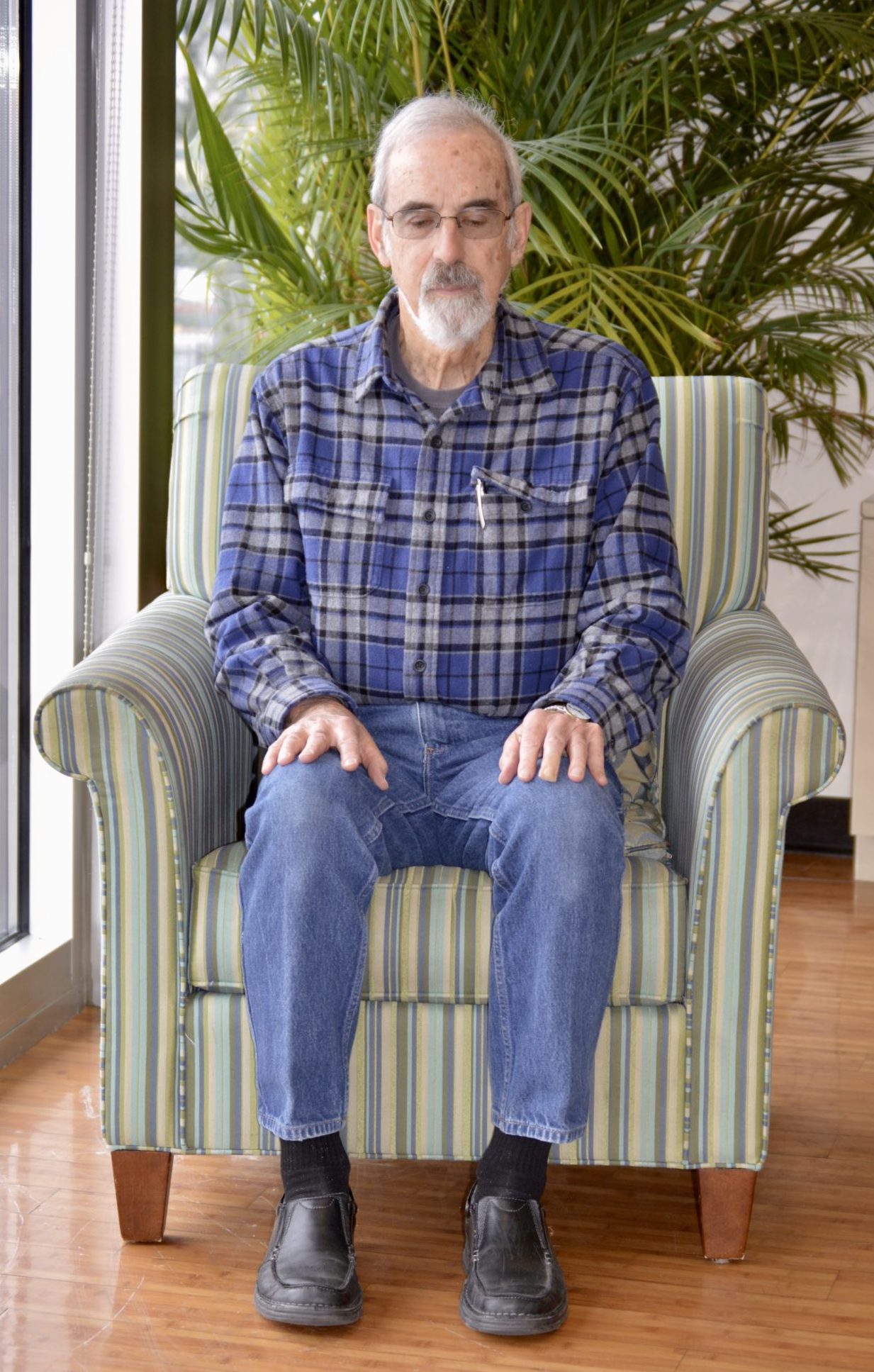
Many hospice volunteers are attracted to their roles because they’ve lost a loved one themselves. They understand the emotions of loss, ranging from the comfort of hospice to the darkness of grief.
That was the case for Peter Mullen, a retired psychologist who leads meditation support groups at HopeHealth’s office in Middletown, RI, and at the Weekend of Hope and Healing grief support retreat.
Peter remembers feeling disoriented after losing his wife five years ago. “Everything in life changes—your whole sense of who you are, your relationship to others, your place in the world,” he says.
Peter is a longtime practitioner of meditation—he and his wife meditated until the day she died—and the practice has helped him to cope.
He says people need two things to manage grief: external support from others and an internal support he calls “that still point.”
Through meditation one learns that “bad feelings don’t happen all the time. They come and go,” Peter explains. “You develop a relationship with your thoughts that makes them less painful and more endurable.”
“Meditation offers a still point when your mind is going in 1,000 directions at once.” – Peter Mullen, meditation group leader
Sparking a smile through pet therapy
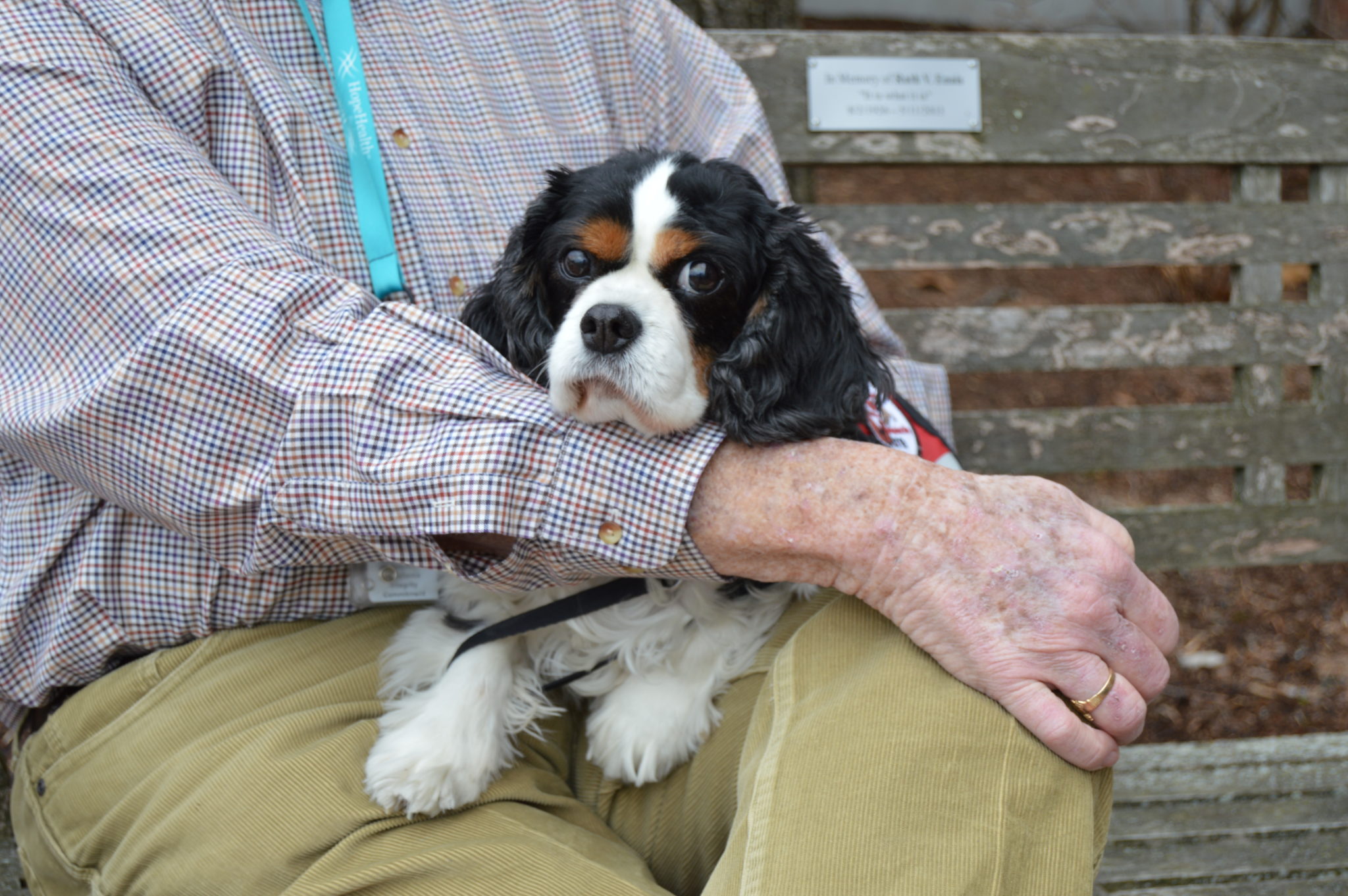
HopeHealth volunteer Dave Reedy is a welcome face to folks at the Hulitar Hospice Center because he always brings a special someone.
“I’m the man who comes with Miss Daily,” he says with a twinkling eye.
Miss Daily is a King Charles Spaniel, and she and Dave are a certified animal therapy team. For eight years they have brightened the day of hospice patients and their families.
Dave, a retired social worker, says pets draw out remarkable, even unexpected reactions in people.
For example, Miss Daily might connect with dementia patients who otherwise ignore people. She breaks the ice between estranged family members. And she encourages families to share stories of their loved ones receiving care.
Dave feels blessed to witness to it all. “Every patient here has a story,” he says.
HopeHealth currently has eight certified pet therapists, all volunteers. Most therapy animals are dogs, although cats and bunnies can be certified, too. (HopeHealth has even had a therapy Alpaca!)
“If someone had dogs all their life, they’re gonna love having a dog at the end of life.” – Dave Reedy, pet therapist
Easing pain and anxiety through Reiki
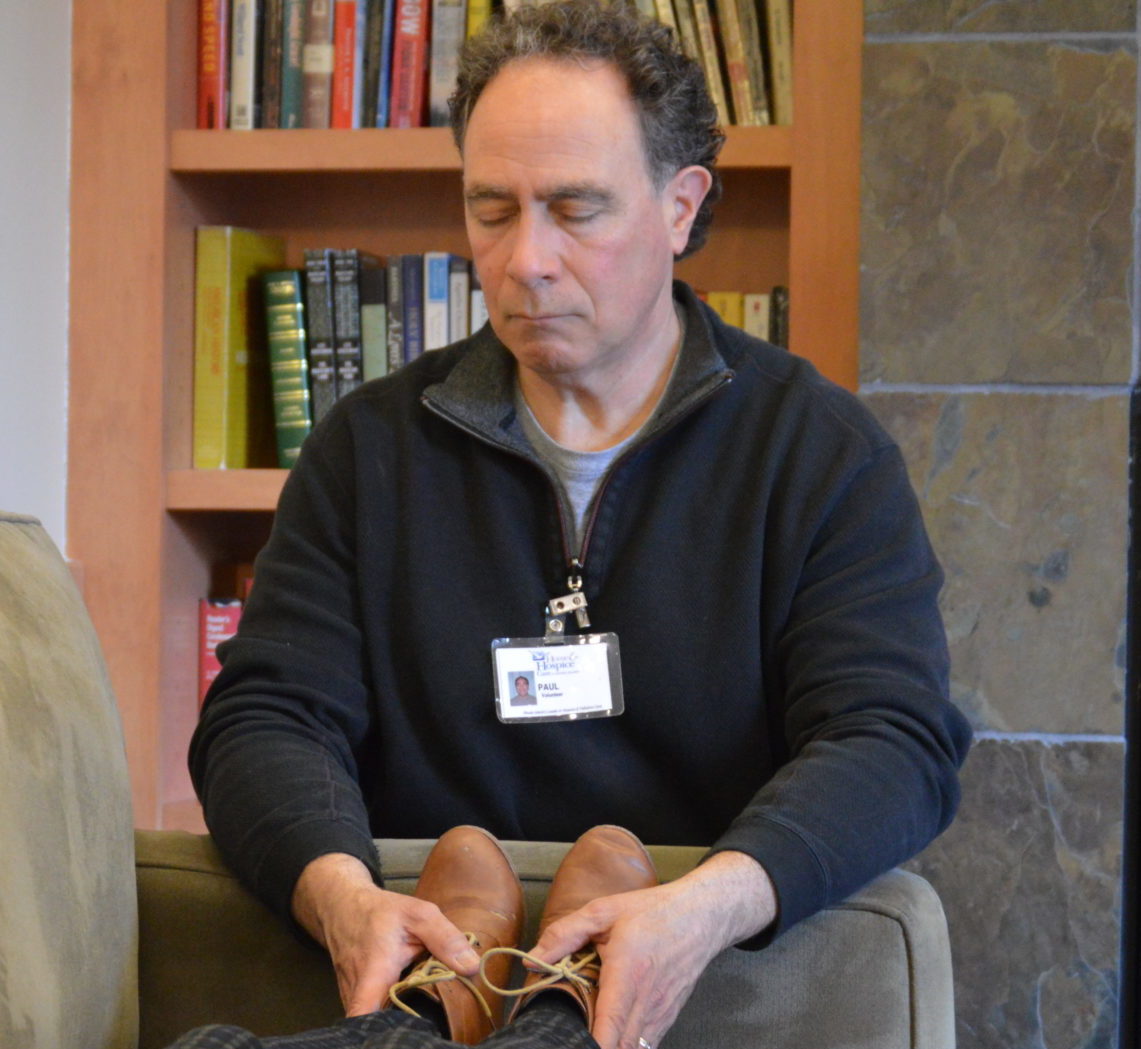 Paul DiSegna is the volunteer with calming hands at HopeHealth. As a Reiki practitioner and teacher, he brings the Eastern practice of healing touch to hospice patients and caregivers.
Paul DiSegna is the volunteer with calming hands at HopeHealth. As a Reiki practitioner and teacher, he brings the Eastern practice of healing touch to hospice patients and caregivers.
Reiki is based on the idea that ”life force energy” flows through us, and human hands can direct that energy for positive effects. “It’s an energy that comes from a higher place,” Paul says.
Western medicine has accepted Reiki as an alternative practice to reduce anxiety, stress, fatigue and pain, according to studies cited in Healing Touch Research.
Paul and other Reiki volunteers are available to visit patients in their homes. “Sometimes they’re skeptical but say, ‘If I’m in pain and it will help me, I’ll give it a try,’” he explains.
A typical session lasts around 30 minutes or when the individual chooses to stop. Paul always asks permission to touch, or he can hover his hands without contact if the individual prefers that.
He also enjoys chatting with family caregivers at home. “I believe we meet people in life for a reason,” he says.
“I don’t perceive it as I’m helping others. They’re helping me.” – Paul DiSegna
Do you have a special skill and would like to bring comfort to others? Let us know!
HopeHealth is looking for volunteer singers, musicians and pet owners interested in getting certified as animal therapists in Rhode Island and Massachusetts. Particularly, we need volunteers in southern Massachusetts.
Learn more at HopeHealthCo.org/Volunteer. For questions, call us at (833) 818-1919 or email VolunteeratHopeHealth@HopeHealthCo.org.

